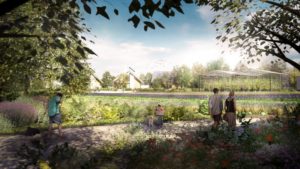
ReGen Village
Credit: ReGen Villages
A half-hour commute from Amsterdam, a piece of farmland is slated to become a new kind of neighborhood. Vertical farms, along with traditional fields and orchards surrounding homes, will supply food to people living there. Food waste will turn into fish feed for on-site aquaculture. Houses will filter rainwater, but won’t have driveways. A “village OS” tech platform will use AI to simultaneously manage systems for renewable energy, food production, water supply, and waste.
The 50-acre neighborhood, which will be nearly self-sufficient as it collects and stores water and energy, grows food, and processes much of its own waste, was initially planned for construction in 2017. The developers, called ReGen Villages, struggled with red tape–the area, on a piece of land that used to be underwater but was reclaimed in the 1960s when a seawall was constructed–has regulations that make it difficult for someone other than an individual homeowner to build on land that is mostly used for farming […]











This is how I wish the USA would have been planned from the beginning, instead of the large cities we have now. The co-op idea is the best way to live, especially the way this article describes it. I praise their attempt to change to a more earth friendly way of living.
left out of this utopian blueprint is that wireless tech is extremely dangerous, especially in long term exposure situations such as wi-fi in schools or at home. wireless tech is not environmentally friendly as it uses more energy of any other application world wide. safer more reliable fiber is the way to go but industry has our politicians, educators and others convinced that wireless is the only option. human life is always a last consideration.